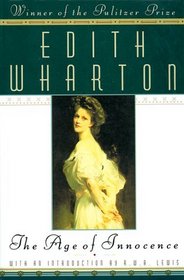Helpful Score: 3
The ending caught me totally off guard and made me cry a bit. It was well worth the effort!
Helpful Score: 3
As so often is the case, the book was much, much better than the movie. Wharton is a master at portraying the intricacies of Victorian society and the characters' inner lives.
Helpful Score: 1
A picture of desire and betrayal in Old New York.
Helpful Score: 1
*** Spoiler Alert ***
I wouldn't say this book was disappointing, but it didn't overwhelm me like some of Wharton's other works, like "Summer." I understood that Wharton was poking fun at the upper class in New York in the early 1900s and a lot of her observations were both keen and humorous; however, it became tedious to read essentially the same conversation over and over. Multiple times various characters talked of scandal within their family and how horrible it all was and how one must keep up appearances, if not for one's own sake, then for that of the family. It also seemed as if every character was somehow related to another. It lent the novel an incestuous feel.
Two people who have barely glimpsed one another and have hardly spoken in depth simply cannot fall in love. Archer's and Ellen's relationship seemed almost as cursory a relationship as Bella's and Edward's from "Twilight," all the moaning and wistful sighs about being together.
In Part II, a strange turn emerges where May, Archer's wife, is suddenly a vacuous husk of a woman in Archer's eyes. Archer comes across as a spoiled and arrogant brat.
What I did appreciate about this book most of all was the very end, where both Archer and Ellen decide to keep their 30-year old memories of each other just as they are rather than befoul them with the aged present. For the same reason, I will never read Wharton's "Summer" again.
I wouldn't say this book was disappointing, but it didn't overwhelm me like some of Wharton's other works, like "Summer." I understood that Wharton was poking fun at the upper class in New York in the early 1900s and a lot of her observations were both keen and humorous; however, it became tedious to read essentially the same conversation over and over. Multiple times various characters talked of scandal within their family and how horrible it all was and how one must keep up appearances, if not for one's own sake, then for that of the family. It also seemed as if every character was somehow related to another. It lent the novel an incestuous feel.
Two people who have barely glimpsed one another and have hardly spoken in depth simply cannot fall in love. Archer's and Ellen's relationship seemed almost as cursory a relationship as Bella's and Edward's from "Twilight," all the moaning and wistful sighs about being together.
In Part II, a strange turn emerges where May, Archer's wife, is suddenly a vacuous husk of a woman in Archer's eyes. Archer comes across as a spoiled and arrogant brat.
What I did appreciate about this book most of all was the very end, where both Archer and Ellen decide to keep their 30-year old memories of each other just as they are rather than befoul them with the aged present. For the same reason, I will never read Wharton's "Summer" again.
Helpful Score: 1
Remarkably written, beautiful love story.




![header=[] body=[Get a free book credit right now by joining the club and listing 5 books you have and are willing to share with other members!] Help icon](/images/question.gif?v=52444873)
